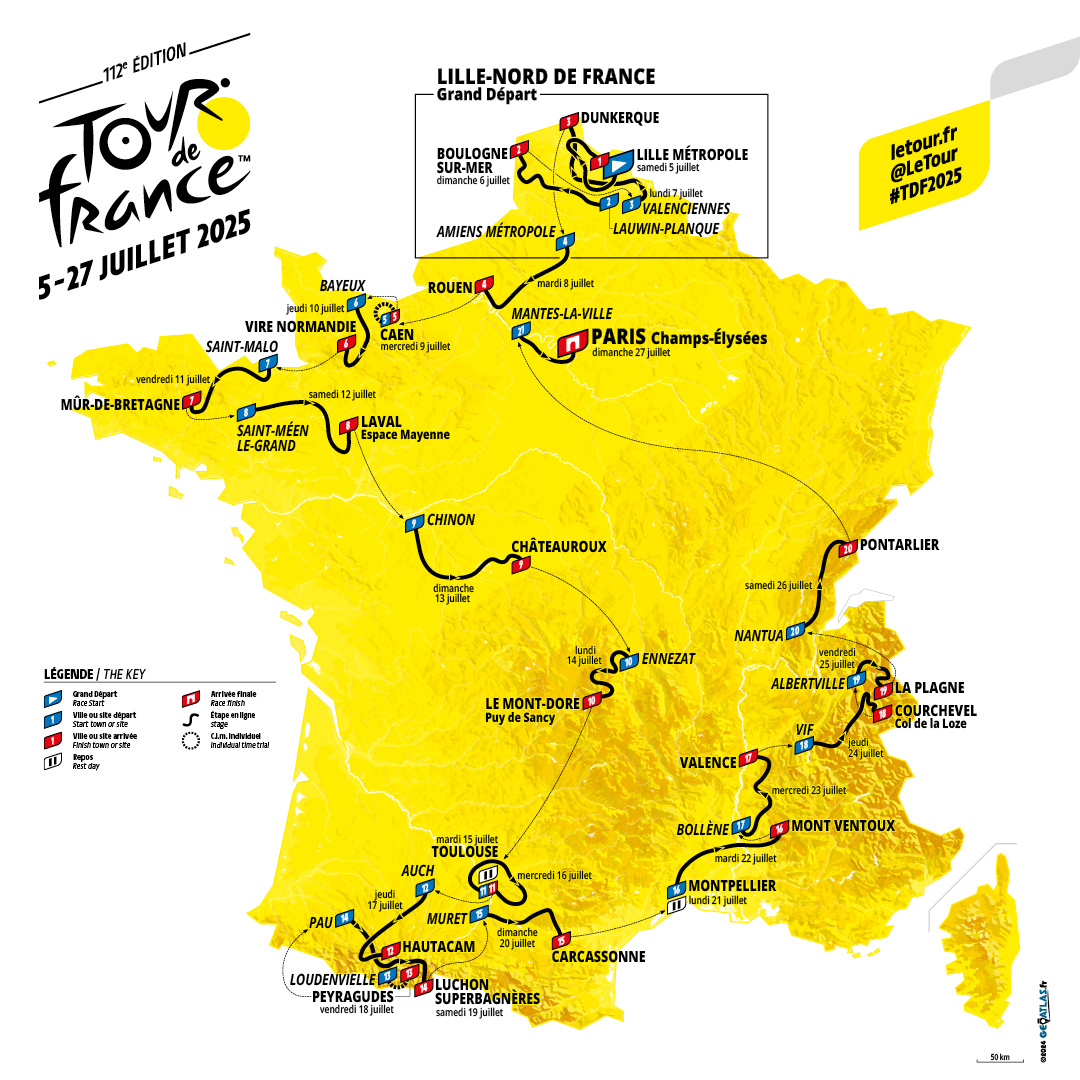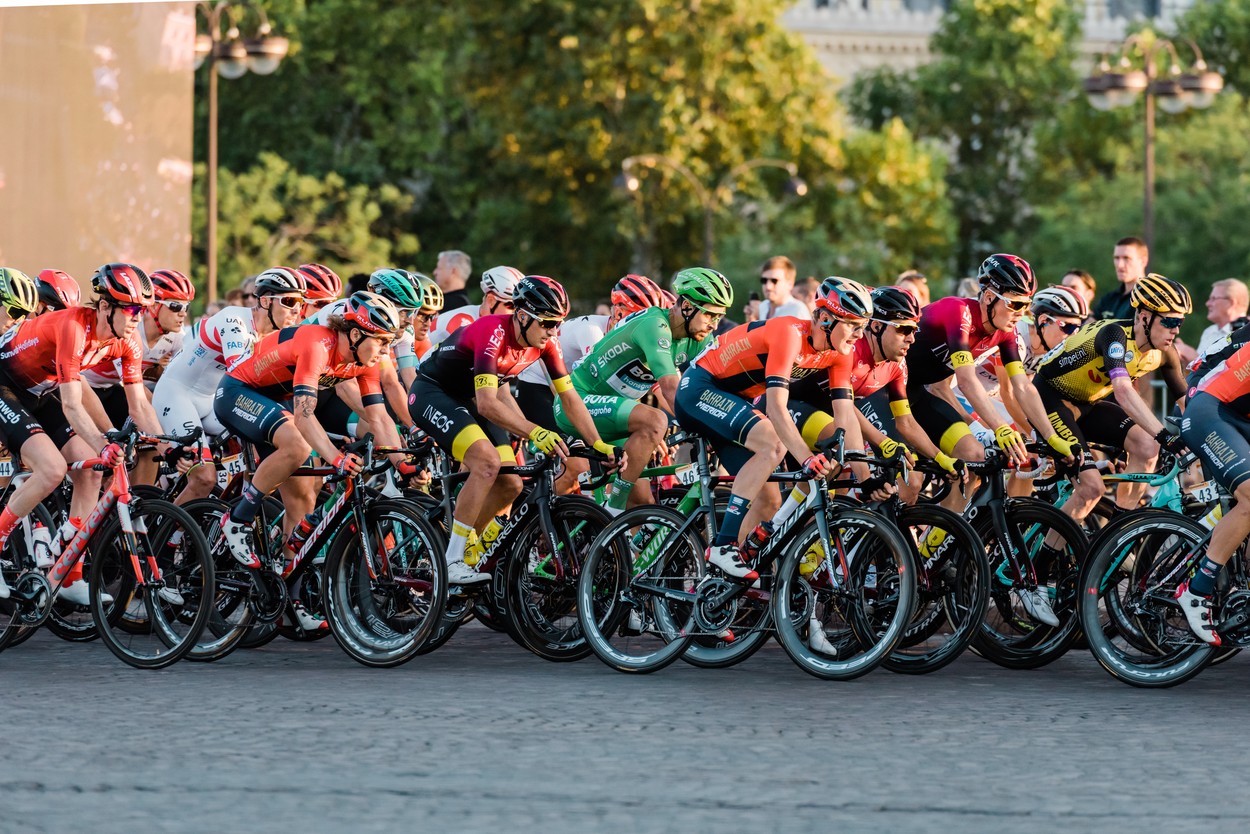
The Tour de France 2025 is already making history before the first pedal stroke, and there are countless fascinating details that even the most dedicated cycling enthusiasts might not know. As the 112th edition of this legendary race unfolds, we're uncovering the remarkable facts, hidden statistics, and surprising elements that make this year's Tour truly extraordinary.
Ready to Revolutionize Your Running Club?
Join thousands of running clubs already using Endurela's AI-powered platform to streamline operations, boost member engagement, and create unforgettable experiences.
Get Early Access NowThe Route That Breaks Tradition
For the first time since 2020, the Tour de France 2025 will remain entirely within French borders. This decision represents a significant departure from recent years when the race regularly ventured into neighboring countries. The 2025 route covers 3,492 kilometers across 21 stages, visiting 11 regions and 34 departments of France.
Did You Know?
The 2025 Tour de France will be the first since 2020 to not cross any international borders, making it a truly "French" Tour in every sense of the word.
Starting in Lille on July 5th, the race takes a unique northern approach that hasn't been seen in decades. The opening stage is a 184.9-kilometer route through Lille Métropole, designed specifically to showcase the industrial heritage and modern transformation of northern France. This strategic choice reflects the organizers' commitment to highlighting lesser-known regions of France that deserve international attention.
The Mathematics of Endurance
The elevation profile of the 2025 Tour presents a fascinating study in strategic race design. With a total elevation gain of approximately 52,000 meters, this year's route includes eight mountain stages, five flat stages suitable for sprinters, and eight stages classified as hilly or medium mountain terrain. The race features four summit finishes, including the legendary Alpe d'Huez on Stage 18, which will mark the 32nd time this iconic climb has been used as a stage finish.
Revolutionary Technology Integration

The 2025 Tour de France introduces groundbreaking technological innovations that are reshaping how we experience professional cycling. For the first time in Tour history, every bicycle will be equipped with advanced telemetry systems that provide real-time data on power output, heart rate, speed, and positioning. This data will be made available to television audiences in real-time, creating an unprecedented level of insight into the physical demands of professional cycling.
Technology Breakthrough
The 2025 Tour will generate over 50 million data points throughout the race, creating the most comprehensive dataset in cycling history.
The integration of artificial intelligence in race analysis represents another significant advancement. AI algorithms will process the massive amounts of data generated during each stage to provide predictive analytics about race outcomes, optimal pacing strategies, and tactical recommendations. This technology, similar to what Endurela uses for running club management, demonstrates how AI is revolutionizing sports at every level.
Environmental Sustainability Initiatives
The 2025 Tour de France has implemented the most comprehensive environmental sustainability program in the race's history. The entire caravan will be carbon-neutral for the first time, achieved through a combination of electric and hybrid vehicles, renewable energy sources for all race infrastructure, and a comprehensive carbon offset program that includes reforestation projects across France.
Transform Your Club's Performance
Discover how Endurela's advanced analytics can help your running club achieve new levels of success, just like the Tour de France uses data to optimize performance.
Start Your Free TrialThe Human Stories Behind the Statistics
Beyond the impressive numbers and technological innovations, the 2025 Tour de France is rich with human stories that capture the essence of this extraordinary sporting event. This year's race features the most diverse field in Tour history, with riders representing 35 different countries across six continents. The youngest rider, at just 20 years old, will be competing alongside veterans who have been racing professionally for over 15 years.
Diversity Milestone
The 2025 Tour features riders from 35 countries, the most international field in the race's 122-year history.
The women's Tour de France Femmes, running concurrently with the men's race for selected stages, has grown significantly since its reintroduction in 2022. The 2025 edition features eight stages covering 1,165 kilometers, representing a 40% increase in distance compared to the inaugural edition. This expansion reflects the growing recognition and support for women's professional cycling.
Economic Impact and Global Reach
The economic impact of the Tour de France 2025 extends far beyond the cycling world. The race is expected to generate over €150 million in direct economic activity for the regions it passes through, with an additional €500 million in indirect economic benefits. The global television audience is projected to exceed 3.5 billion viewers across 190 countries, making it one of the most-watched sporting events in the world.
Training and Preparation Secrets
The preparation required for the Tour de France 2025 represents the pinnacle of athletic training and scientific sports preparation. Professional cyclists typically spend 8-10 months preparing specifically for the Tour, covering between 25,000 to 35,000 kilometers in training. The most elite riders will have completed altitude training camps at elevations exceeding 2,500 meters, simulating the oxygen-depleted conditions they'll face in the high mountains of the Alps and Pyrenees.
Training Volume
Tour de France riders typically train 25-35 hours per week during peak preparation, burning 6,000-8,000 calories daily.
Nutritional preparation for the Tour requires consuming approximately 8,000 calories per day during the race, with riders eating every 20-30 minutes during stages. The logistics of feeding 176 riders throughout the race requires a support team of over 300 people, including chefs, nutritionists, and logistics coordinators who prepare and distribute more than 40,000 meals throughout the three-week event.
The Science of Speed
The aerodynamic innovations introduced for the 2025 Tour represent years of research and development in wind tunnel testing and computational fluid dynamics. Modern Tour de France bicycles, weighing exactly 6.8 kilograms (the UCI minimum weight limit), incorporate materials and designs that would have been considered science fiction just a decade ago. Carbon fiber frames are now complemented by 3D-printed titanium components and ceramic bearings that reduce friction to nearly zero.
Build Your Cycling Community
Whether you manage a running club or cycling group, Endurela's platform helps you create the same level of organization and engagement that makes the Tour de France possible.
Join the RevolutionHistorical Context and Legacy
The 2025 Tour de France continues a tradition that began in 1903 when Maurice Garin won the inaugural race covering 2,428 kilometers in six stages. The evolution from that first race to today's sophisticated sporting spectacle represents one of the most remarkable transformations in sports history. The 2025 edition will be the 112th Tour de France, though the race was interrupted during both World Wars, with no races held from 1915-1918 and 1940-1946.
Historical Perspective
If Maurice Garin, the 1903 winner, could see the 2025 Tour, he would witness average speeds that are 40% faster despite courses that are 45% longer.
The cultural impact of the Tour de France extends far beyond cycling, influencing fashion, tourism, and even urban planning in France. Cities and regions compete intensely for the privilege of hosting Tour stages, with the economic and promotional benefits lasting for years after the race passes through. The 2025 route was selected from over 200 applications from French municipalities, each presenting detailed proposals for how they would showcase their region to the global audience.
The Future of Professional Cycling
The innovations introduced in the 2025 Tour de France provide a glimpse into the future of professional cycling. The integration of real-time biometric monitoring, AI-powered race analysis, and enhanced fan engagement through digital platforms represents a fundamental shift in how cycling is experienced and understood. These technological advances are creating new opportunities for fan engagement while providing unprecedented insights into human athletic performance.
The sustainability initiatives implemented for the 2025 Tour are setting new standards for major sporting events worldwide. The carbon-neutral caravan, zero-waste policies, and renewable energy infrastructure demonstrate that large-scale sporting events can be environmentally responsible while maintaining their spectacular nature and global appeal.
Conclusion: More Than Just a Race
The Tour de France 2025 represents far more than a cycling race; it's a celebration of human endurance, technological innovation, and cultural heritage. The facts and figures we've explored reveal the extraordinary complexity and scale of an event that captivates billions of people worldwide. From the strategic route planning that showcases France's diverse landscapes to the cutting-edge technology that provides unprecedented insights into athletic performance, every aspect of the 2025 Tour reflects the evolution of sport in the 21st century.
As we watch the 2025 Tour unfold, we're witnessing not just a competition between elite athletes, but a showcase of human potential, technological innovation, and the enduring appeal of one of sport's greatest challenges. Whether you're a cycling enthusiast, a technology lover, or simply someone who appreciates extraordinary human achievement, the Tour de France 2025 offers something remarkable to discover and celebrate.
Ready to Lead Your Own Championship?
Join the thousands of sports clubs already using Endurela to create championship-level experiences for their members. Get early access to the platform that's revolutionizing sports club management.
Get Started TodayAbout Endurela: Endurela is the leading AI-powered platform for running club management, helping clubs worldwide streamline operations, boost member engagement, and create exceptional experiences. Learn more about how we're revolutionizing sports club management at endurela.com.